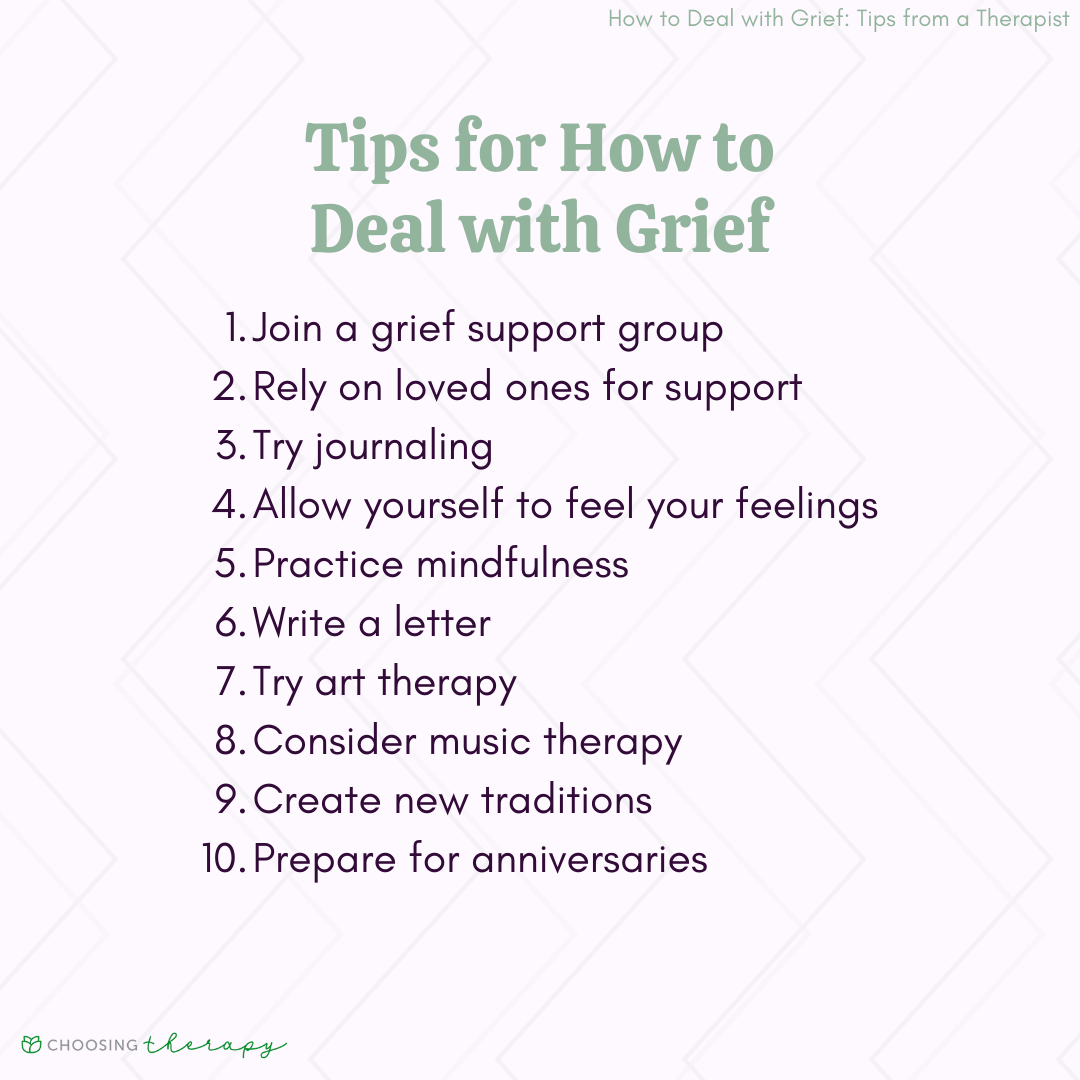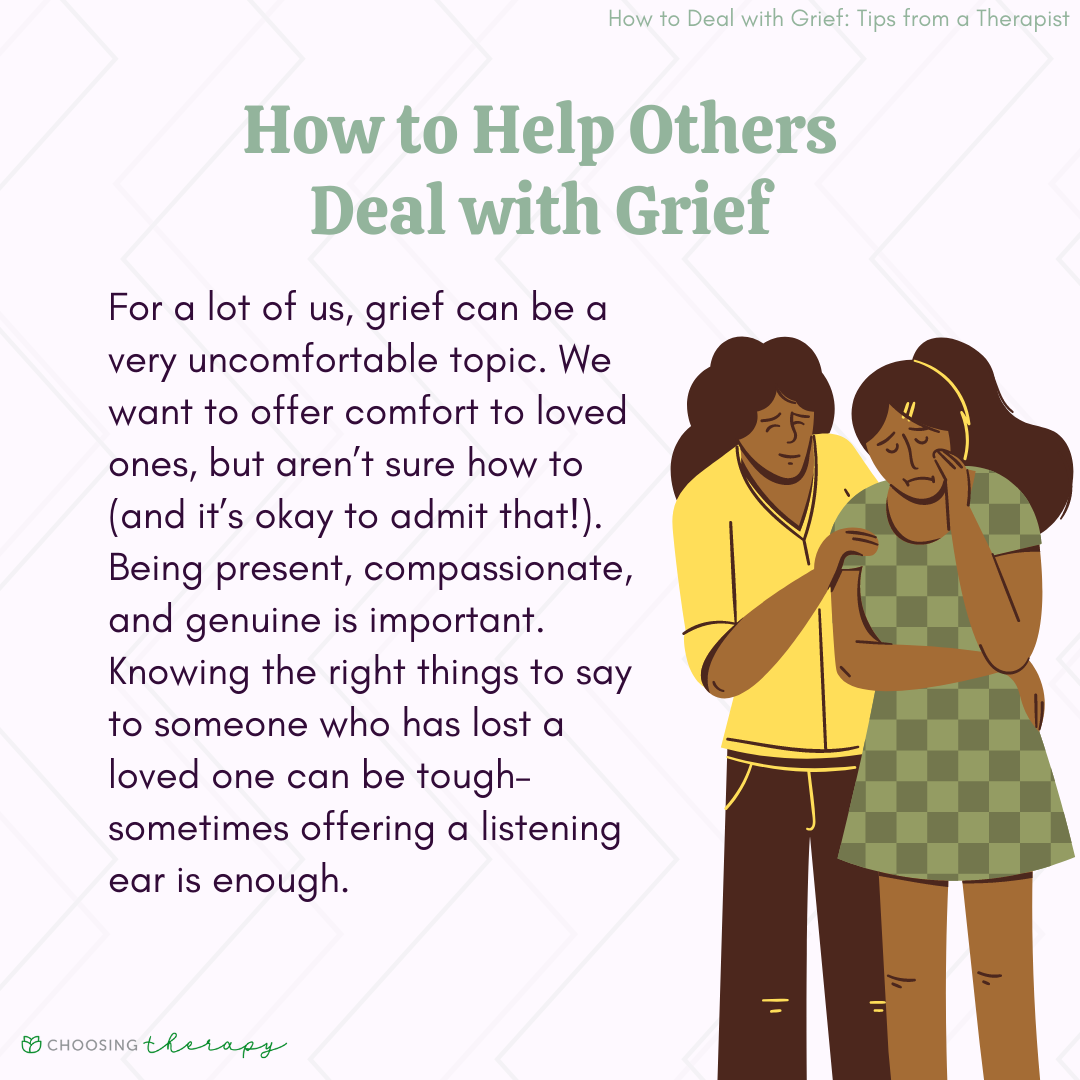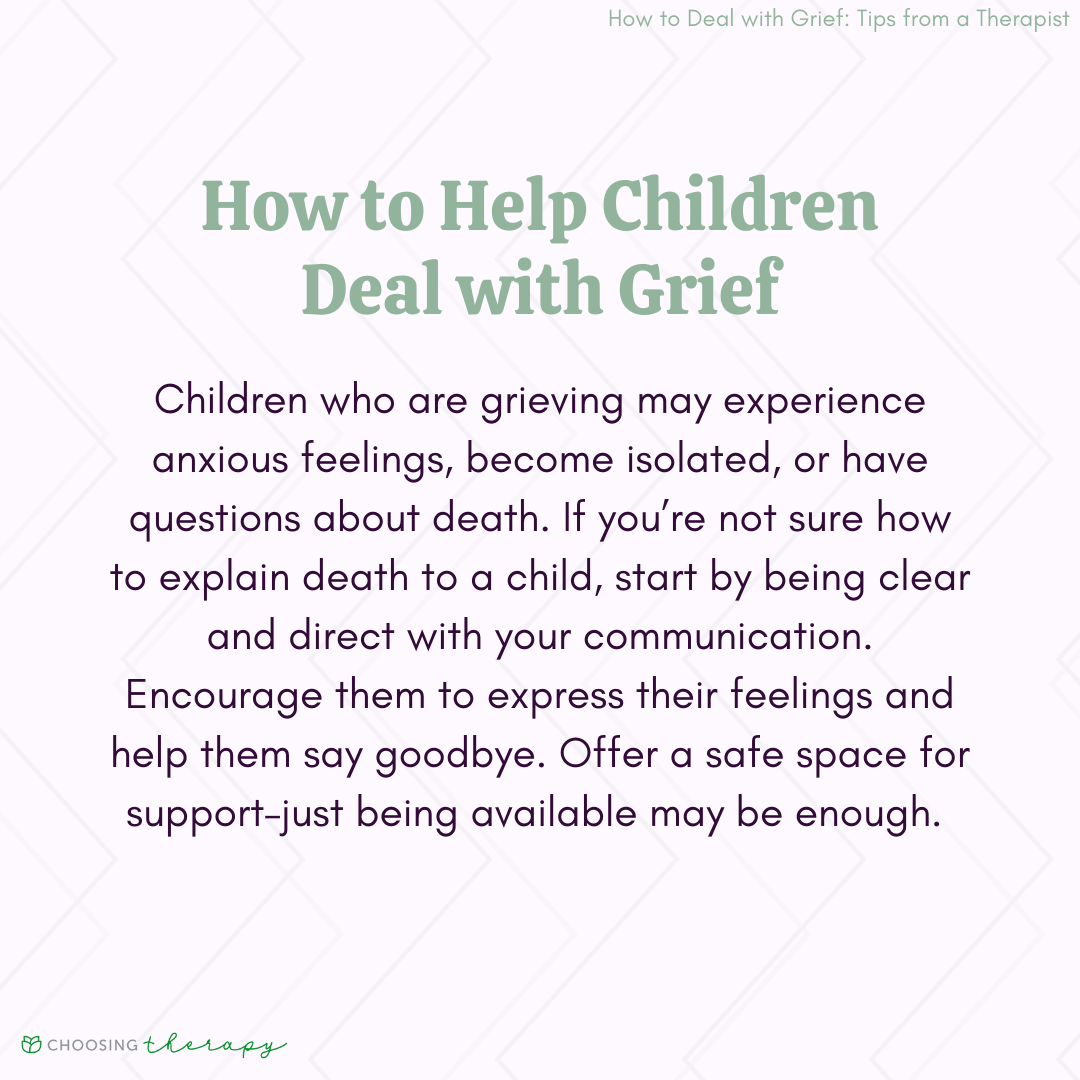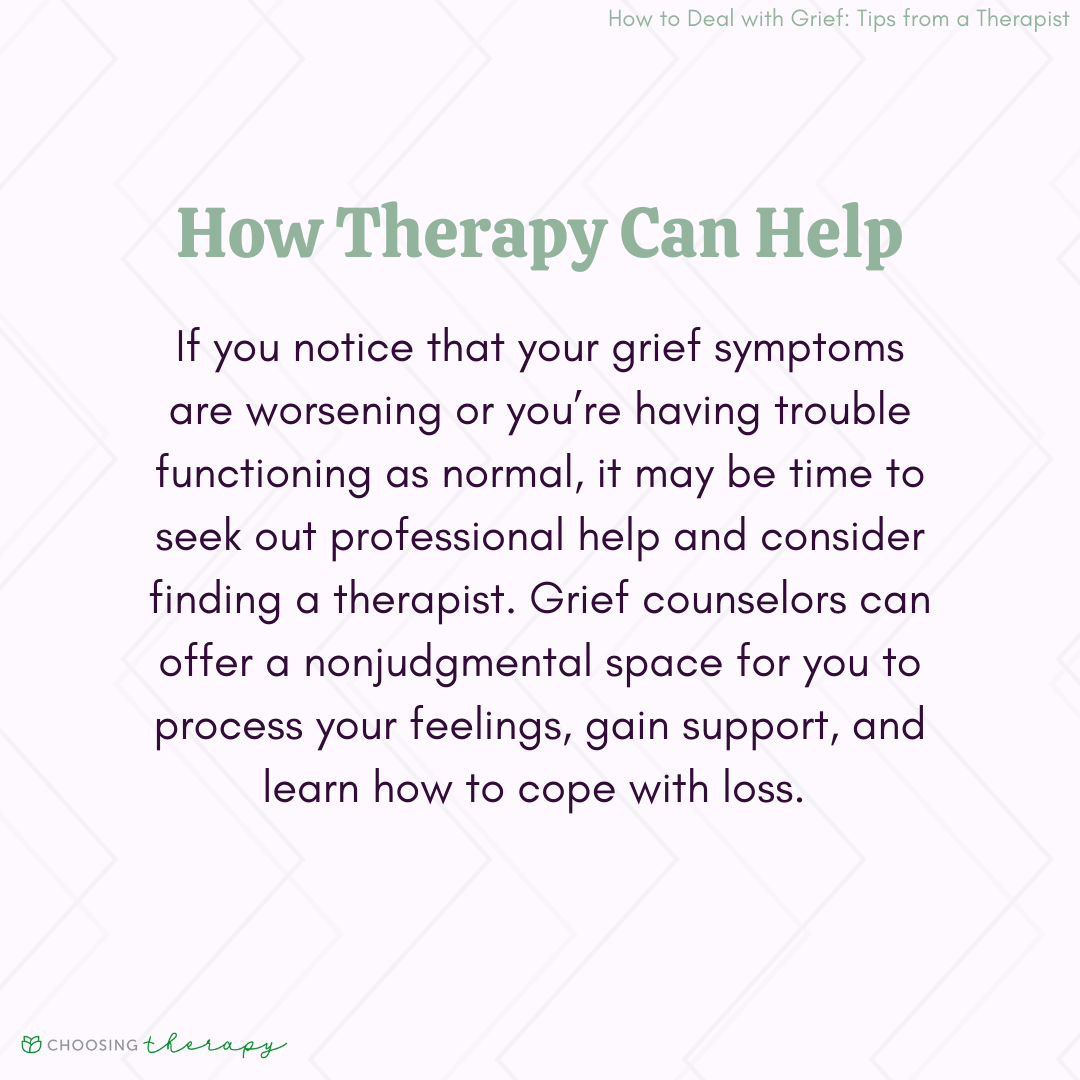Grief includes the deep sorrow or intense emotional reactions a person experiences after a loss. Although every person processes grief differently, there are many ways to manage these intense and complex feelings. Coping with grief can include seeking and providing support, maintaining emotional self-care, and seeking therapy.
Healing from a loss can take many years.
You don’t have to deal with grief on your own. BetterHelp has over 20,000 licensed therapists who provide convenient and affordable online therapy. BetterHelp starts at $65 per week. Take a Free Online Assessment and get matched with the right therapist for you.
What to Expect When Dealing With Grief
Grief and loss affects everyone differently as it is a very unique and individualized experience. It can be complex and one can expect to feel a range of emotions related to a loss, such as guilt, anger, and fear. There is no right or wrong way to grieve–grief is not linear. A person does not need to follow a specific sequence of steps in order to heal properly.
There are many types of grief, and it can occur for many reasons, including the death of a parent, child, or friend. It can also affect people if they have recently lost a job, pet, or even a relationship. It’s important to remember that a person can grieve any kind of loss. However, based on the type of loss, one may experience different types of grief.
Although there is no timeline for grieving, one’s mental and emotional well-being should start to improve (even just a little) over time. If the loss included a close relation or loved one, grief can worsen over time and develop into a persistent complex bereavement disorder.
Common types of grief include:
Symptoms of Grief
Symptoms of grief can be physical, cognitive, emotional, and behavioral. These can impact all aspects of a person’s life. Common grief symptoms include headaches, insomnia, fatigue, crying, confusion, and memory problems. Complicated grief symptoms are more intense and prolonged, including trouble accepting a death, ruminating on a loss, and emotional numbness.
Symptoms of grief may include:
- Changes in sleeping patterns: Sleep problems and insomnia are common grief symptoms.1 Poor sleep could result from a person sleeping alone after losing a spouse; worry about financial difficulties due to a job loss; or other physical symptoms of grief that affect sleep.
- Changes in eating habits: Emotional eating can occur when grieving because eating releases ‘feel-good’ endorphins. However, long-term overeating can lead to gaining excess weight, which has serious impacts on one’s health.2
- Feelings of guilt: As someone reflects on their grief, they may feel guilty about what they should have done before experiencing the loss. For example, they may wish they had spent more time with a loved one who has passed.3
- Anger: A person can experience different types of anger when grieving. For instance, they may be angry at a loved one for leaving them.
- Fear: Grief can make a person worry about their own health, mortality, identity, or ending up alone.
- Confusion: Grief can cause a person to feel disoriented or confused as their mind tries to make sense of a loss.
- Loneliness: Someone may experience intense loneliness after losing a spouse, social circle, or secondary relationship.
10 Tips for How to Deal With Grief
While grieving, you will experience a range of difficult emotions. Remind yourself that there is no timeline for this process and no correct way to approach it. Grief is an individualized process, and it’s essential to treat yourself with kindness and compassion. Provide yourself with support and stay connected to family and friends.
Below are 10 tips for dealing with loss:
1. Join a Grief Support Group
Online group therapy and support groups are not only a way to find support for yourself, but also provide it to others who are struggling. This can be both validating and empowering. In these settings, you can connect with people who are experiencing similar situations. Doing so can combat the loneliness you may feel after a loss. You can also learn coping skills from members to help you manage symptoms of grief.4
<h2″>2. Rely on Loved Ones for Support
Asking for help can be difficult, but it’s important nonetheless. If your family or friends asked for help, you wouldn’t think twice about saying yes! After a loss, you may feel overwhelmed, hopeless, or struggle to complete normal tasks. Loved ones can provide emotional support and possibly help you tackle responsibilities, too.
3. Try Journaling
Journaling is a non-verbal therapeutic technique to help you move through and understand your grief. By writing things down, you can give your memories more meaning, work through your emotions, or just “get out of your head.” If you’re unsure of how to start, there are many grief journal prompts you can use.
4. Allow Yourself to Feel Your Feelings
Grief differs person-to-person and there is no timeframe for when you should “get over” a loss. You may randomly think about the person you lost and become sad or angry–all of those emotions are valid. Allow yourself to notice the feelings in the moment and remain present with your emotions. This helps reduce the risk of ignoring your feelings and developing unhealthy habits or behaviors in the future
5. Practice Mindfulness
Mindfulness is the act of being present in the moment without judgment. This can help you identify your grief and feelings, without attaching negative or unwanted thoughts to them. Guided imagery, deep breathing, and progressive muscle relaxation are all self-care tools to keep you focused on the here and now.
6. Write a Letter
If you wish you had said something to a loved one before they passed; have racing thoughts that you can’t get rid of; or have a hard time expressing yourself verbally, writing a letter can be a cathartic release. This letter could be to the person you lost, or to provide family with ways they can support you as you grieve.
7. Try Art therapy
Some may feel that it’s too exhausting to talk about what they are experiencing. However, it’s still important to have an outlet for these feelings, and art therapy can be a great avenue to consider. You do not need to be an artist to participate in art therapy, as it’s simply focused on helping you throughout the grieving process. Sessions can include the use of various mediums, such as painting or collage making.
8. Consider Music Therapy
Music therapy can be utilized to manage symptoms of grief as clients listen to or create music. Additionally, listening to soothing music can calm your mind if you’re feeling anxious or remind you of the person you lost.
9. Create New Traditions
Anniversaries and holidays can be difficult after you lose a loved one. Try creating new traditions to remember this person during tough times. For example, there are many ways to remember someone on their death anniversary, such as visiting their gravesite, looking through photographs, or cooking their favorite meal.
10. Prepare for Anniversaries
The time leading up to a death anniversary can be especially challenging. It’s important to prepare yourself as you may be feeling increasingly sensitive, sad, or upset. This may include taking the day off work (if possible), doing something special to remember the person, or planning something fun with family.
Help For Grief & Loss
Talk Therapy – Get personalized help in dealing with a loss from a licensed professional. BetterHelp offers online sessions by video or text. Free Assessment
Ketamine Program For Depression, Anxiety, and Trauma – Nue.life offers an at-home, evidence-based ketamine program supported by hundreds of clinical studies. Our clients feel rapid & lasting relief within hours after the first treatment. Learn More
How to Help Others Deal With Grief
For a lot of us, grief can be a very uncomfortable topic. We want to offer comfort to loved ones, but aren’t sure how to (and it’s okay to admit that!). Being present, compassionate, and genuine is important. Knowing the right things to say to someone who has lost a loved one or what to say when someone dies can be tough–sometimes offering a listening ear is enough.
If someone you know is struggling with grief, some things you can do include:
- Be patient: Everyone grieves on their own timeframe. Try not to put any expectations of what grief should look like and just be present with your loved one.
- Offer practical help: The person who is grieving might not know how to ask for help. Instead of putting this responsibility back on them by saying, “Let me know what I can do”, use statements like, “I’d love to bring you dinner tomorrow night.”
- Don’t make it about you: It’s normal to try and relate to someone’s experience, but this can be invalidating. Instead, just be open to listening and providing support.
- Check in during the holidays/anniversaries: Holidays and other big milestones can be a trigger. Check in with your loved one more often during these times.
- Discuss the loss: The person who is grieving will still want to remember their loved one who passed. They may feel like the rest of the world is moving on without them. You can bring up fond memories or ask your loved one if they have a favorite memory they’d like to share.
How to Help Children Deal With Grief
Children who are grieving may experience anxious feelings, become isolated, or have questions about death. If you’re not sure how to explain death to a child, start by being clear and direct with your communication. Encourage them to express their feelings and help them say goodbye. Offer a safe space for support–just being available may be enough.
Some ways to help children deal with grief and loss include:
- Allow them to express their feelings: Children may experience a range of emotions related to a loss. Allow them to cry and comfort them. If the distress lasts longer than a few weeks or impacts their functioning, reach out to a therapist or their pediatrician.
- Be honest with them: Be clear and use simple language about loss. If you are vague about a death, this can lead to complicated grief. You may not need to tell them every detail, but you can be clear about the fact that someone died and use language that is appropriate for their age.
- Spend time with them: A child may feel extra vulnerable or scared after a loss. Spending more time with them can not only decrease loneliness, but provide opportunities for you to support and comfort them through this challenging time.
- Keep up with hobbies and activities: Maintaining a routine is important to help your child know what to expect in their day-to-day life while also providing a healthy distraction.
- Speak about the loss: Discussing a loss helps a person heal, and your child may need more time than you think to process their grief. It’s okay to be open about the person who died and encourage your child to talk about this as well.
How Therapy Can Help
If you notice that your grief symptoms are worsening or you’re having trouble functioning as normal, it may be time to seek out professional help and consider finding a therapist. Grief counselors can offer a nonjudgmental space for you to process your feelings, gain support, and learn how to cope with loss.
When looking for a therapist, it’s most important that you choose someone who you can connect with and trust. A therapist specializing in grief understands the grieving process and can offer practical guidance. If you experienced traumatic grief, a trauma-based therapy approach would also be an appropriate choice.
Therapy options for coping with grief may include:
- Individual therapy: This is a one-to-one setting in which you work with a therapist to process emotions. It involves talk therapy or other modalities that may or may not focus specifically on grief and loss.
- Grief counseling: Grief counseling focuses on healing from a loss, and the therapist would have specific training in this process to help you cope and resolve painful thoughts or emotions.
- Group therapy: Group therapy is a way to connect with other people who have experienced a loss as well. There are groups specific to the type of loss as well (loss of a child, loss of a spouse, etc.).
- Online therapy options: Even if you have a busy schedule, you can utilize online therapy options to help cope with your loss. Online therapy is just as effective as traditional in-person modalities, but provided in the comfort of your own home.
- Eye Movement Desensitization Reprocessing (EMDR): If you suffered a traumatic loss or are dealing with complicated grief, EMDR is a trauma-based therapy that helps a person reprocess traumatic memories to make them neutral and less disturbing.
Final Thoughts
Grief is universal as everyone will experience it at some point in their lives. It is a personal and unique experience, and there is no right or wrong way to grieve. There are many options available to you if you’re struggling with intense or painful emotions–you don’t need to deal with grief on your own.
Additional Resources
To help our readers take the next step in their mental health journey, Choosing Therapy has partnered with leaders in mental health and wellness. Choosing Therapy is compensated for marketing by the companies included below.
Online Therapy
BetterHelp Get support and guidance from a licensed therapist. BetterHelp has over 20,000 therapists who provide convenient and affordable online therapy. Take A Free Online Assessment and get matched with the right therapist for you. Free Assessment
Ketamine Program For Depression, Anxiety, and Trauma
Nue.life offers an at-home, evidence-based ketamine program supported by hundreds of clinical studies. Our clients feel rapid & lasting relief within hours after the first treatment. Learn More
Grief And Loss Newsletter
A free newsletter from Choosing Therapy for those impacted by the loss of a loved one. Get encouragement, helpful tips, and the latest information. Sign Up
Best Online Therapy Services There are a number of factors to consider when trying to determine which online therapy platform is going to be the best fit for you. It’s important to be mindful of what each platform costs, the services they provide you with, their providers’ training and level of expertise, and several other important criteria.
Best Online Psychiatry Services Online psychiatry, sometimes called telepsychiatry, platforms offer medication management by phone, video, or secure messaging for a variety of mental health conditions. In some cases, online psychiatry may be more affordable than seeing an in-person provider. Mental health treatment has expanded to include many online psychiatry and therapy services. With so many choices, it can feel overwhelming to find the one that is right for you.









